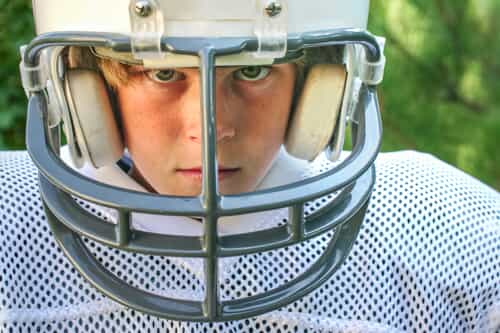What You Should Know About Concussions

With over one million high school football players suffering from concussions every year, the players, their parents, and team coaches must be prepared to know what to do if an athlete suffers a blow to the head.
Although many athletes would want to continue to play after something as minor as a hangnail or a scraped knee occurs, concussions should not be ignored.
What Is a Concussion?
Concussions are a type of traumatic brain injury (TBI) most commonly occur by a sudden impact to the head or body that causes the head to shake violently. Although many think a concussion will cause someone to pass out or lose consciousness, that’s not always the case. The signs are often much more subtle than that, and it’s possible to suffer from a concussion without even knowing it.
Fortunately, most athletes fully recover from concussions within a week or so. However, once an athlete sustains a concussion, they are at greater risk of having another. Suffering from repeated concussions is very dangerous and can have long-term consequences, including depression, memory issues, and difficulty learning new things.
The Symptoms of a Concussion
Knowing how concussions occur, as well as the signs and symptoms can save a life.
The most common symptoms include:
- Headache
- Appearing dazed
- Forgetfulness
- Confusion
- Dizziness
- Nausea or vomiting
- Fatigue
- Personality changes
- Light or sound sensitivity
- Irritability
- Trouble balancing
- Difficulty communicating
It’s also important to note that symptoms don’t always show up right after impact.
How Common Are Concussions?
Sports concussions are alarmingly common, and even though athletes who play contact sports such as football or hockey are at a higher risk, they can happen to anyone at any age.
Preventing a Concussion
Concussion prevention starts with proper equipment. It is essential that football players wear a properly fitted helmet, and wear it consistently and correctly. You’ll want to make sure it the helmet is certified for use in your particular sport.
It’s important to know that there is no such thing as a concussion-proof helmet. That’s why football coaches must emphasize good sportsmanship, safety, and they must enforce rules of the game. A coach who sees a player who has hit their head must pull their athletes from gameplay.
What to Do After a Blow to the Head
If you suspect you or someone you know has suffered a concussion, it’s important that they go to the doctor right away. Once a concussion has been diagnosed, physical and mental rest will be needed for a full recovery. Listening to your doctor’s direction is vital and always make sure you have clearance from your doctor before hitting the field.
Comprehensive Diagnosis & Treatment
If you are an active person who experienced a blow to the head, you should seek immediate medical attention. IF you are looking for prevention tips or have questions about your recovery, Methodist Sports Medicine is here to help. Contact us, or give us a call at (214) 947-6296.
